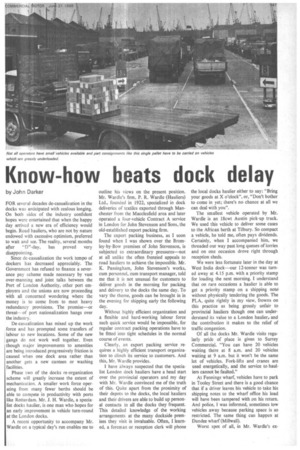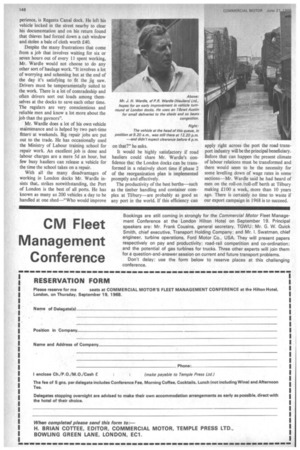Know-how beats dock delay
Page 149

Page 150

If you've noticed an error in this article please click here to report it so we can fix it.
by John Darker
FOR several decades de-casualization in the docks was anticipated with zealous longing. On both sides of the industry confident hopes were entertained that when the happy day arrived a new era of efficiency would begin. Road hauliers, who are not by nature endowed with excessive optimism, preferred to wait and see. The reality, several months after "D"-day, has proved very disappointing.
• Since de-casualization the work tempo of dockers has decreased appreciably. The Government has refused to finance a severance pay scheme made necessary by vast over-manning and joint talks between the Port of London Authority, other port employers and the unions are now proceeding With all concerned wondering where the money is to come from to meet heavy redundancy provisions. The promise—or threat—of port nationalization hangs over the industry.
De-casuatization has mixed up the work force and has prompted some transfers of labour to new locations. Some of the new gangs do not work well together. Even though major improvements to amenities are being introduced progressively friction is caused when one dock area rather than another gets a new canteen or washing facilities.
Phase two of the docks re-organization scheme will greatly increase the extent of mechanization. A smaller work force operating from many fewer berths should be able to compete in productivity with ports like Rotterdam. Mr. J. H. Wardle, a specialist docks haulier, is one man who hopes for an early improvement in vehicle turn-round at the London docks.
A recent opportunity to accompany Mr. Wardle on a typical day's run enables me to outline his views on the present position. Mr. Wardle's firm, P. R. Wardle (Hauliers) Ltd., founded in 1922, specialized in dock deliveries of textiles exported through Manchester from the Macclesfield area and later operated a four-vehicle Contract A service in London for John Stevenson and Sons, the old-established export packing firm.
The export packing business, as I soon found when I was shown over the Bromley-by-Bow premises of John Stevenson, is subjected to extraordinary pressures—not at all unlike the often frenzied appeals to road hauliers to achieve the impossible. Mr. K. Passingham, John Stevenson's works, cum personnel, cum transport manager, told me that it is not unusual for customers to deliver goods in the morning for packing and delivery to the docks the same day. To vary the theme, goods can be brought in in the evening for shipping early the following day.
Without highly efficient organization and a flexible and hard-working labour force such quick service would be impossible, for regular contract packing operations have to be fitted into tight schedules in the normal course of events.
Clearly, an export packing service requires a highly efficient transport organization to clinch its service to customers. And this, Mr. Wardle provides.
have always suspected that the specialist London dock hauliers have a head start over the provincial operators and my day with Mr. Wardle convinced me of the truth of this. Quite apart from the proximity of their depots to the docks, the local hauliers and their drivers are able to build up personal contacts in all the docks they frequent. This detailed knowledge of the working arrangements at the many dockside premises they visit is invaluable. Often, I learned, a foreman or reception clerk will phone the local docks haulier either to say: "Bring your goods at X o'clock", or, "Don't bother to come in yet; there's no chance at all we can deal with you".
The smallest vehicle operated by Mr. Wardle is an 18cwt Austin pick-up truck. We used this vehicle to deliver some cases to the African berth at Tilbury. So compact a vehicle, he told me, often pays dividends. Certainly, when I accompanied him, we threaded our way past long queues of lorries and on one occasion drove right through reception sheds.
We were less fortunate later in the day at West India dock—our 12-tonner was turned away at 4.15 p.m. with a priority stamp for loading the next morning. I understand that on rare occasions a haulier is able to get a priority stamp on a shipping note, without physically tendering the goods. The PLA, quite rightly in my view, frowns on this practice as being grossly unfair to provincial hauliers though one can underderstand its value to a London haulier, and the contribution it makes to the relief of traffic congestion.
Of all the docks Mr. Wardle visits regularly pride of place is given to Surrey Commercial. "You can have 20 vehicles waiting there at 8 a.m. and 20 vehicles waiting at 9 a.m. but it won't be the same lot of vehicles. Fork-lifts and cranes are used energetically, and the service to hauliers cannot be faulted."
At Fennings wharf, vehicles have to park in Tooley Street and there is a good chance that if a driver leaves his vehicle to take his shipping notes to the wharf office his load will have been tampered with on his return. And police, 1 was informed, sometimes tow vehicles away because parking space is so restricted. The same thing can happen at Dundee wharf (Millwall).
Worst spot of all, in Mr. Wardle's ex perience, is Regents Canal dock. He left his vehicle locked in the street nearby to clear his documentation and on his return found that thieves had forced down a cab window and stolen a bale of cloth worth £40.
Despite the many frustrations that come from a job that involves waiting for six or seven hours out of every 11 spent working, Mr. Wardle would not choose to do any other sort of haulage work. "It involves a lot of worrying and scheming but at the end of the day it's satisfying to fit the jig saw. Drivers must be temperamentally suited to the work. There is a lot of comradeship and often drivers sort out loads among themselves at the docks to save each other time. The regulars are very conscientious and reliable men and know a lot more about the job than the guvnors".
Mr. Wardle does a lot of his own vehicle maintenance and is helped by two part-time fitters at weekends. Big repair jobs are put out to the trade. He has occasionally used the Ministry of Labour training school for repair work. An excellent job is done and labour charges are a mere 5d an hour, but few busy hauliers can release a vehicle for the time the school takes on a repair.
With all • the many disadvantages of working in London docks Mr. Wardle insists that, strikes notwithstanding, the Port of London is the best of all ports. He has known as many as 200 vehicles a day to be .handled at one shed—"Who would improve
on that?" he asks.
It would be highly satisfactory if road hauliers could share Mr. Wardle's confidence that the London docks can be transformed in a relatively short time if phase 2 of the reorganization plan is implemented promptly and effectively.
The productivity of the best berths—such as the timber handling and container complex at Tilbury—are probably as good as any port in the world. If this efficiency can apply right across the port the road transport industry will be the principal beneficiary. Before that can happen the present climate of labour relations must be transformed and there would seem to be the necessity for some levelling down of wage rates in some sections—Mr. Wardle said he had heard of men on the roll-on/roll-off berth at Tilbury making £100 a week, more than 10 years ago. There is certainly no time to waste if our export campaign in 1968 is to succeed.








































































































































































































